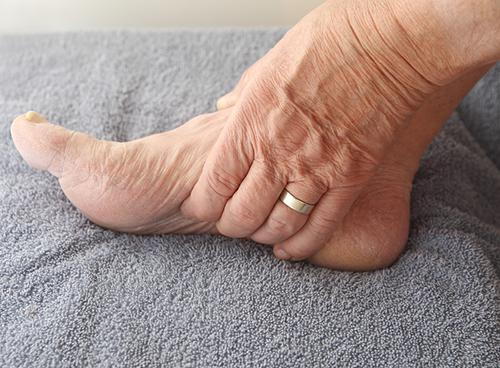Are Pumice Stones Safe?
posted: Jun. 26, 2017.
Your foot doctor in Alexandria, VA, wants you to understand the basics of caring for your feet--the parts of your body that support and  carry you through your busy day. If you notice that your feet are rough, dry and callused, you are not alone. Most adults experience some unsightly toughening of the skin on their heels, soles of the feet and toes, and they often use pumice stones to relieve those symptoms. Dr. Angelo Pace at Advanced Pace Foot and Ankle Center tells his patients the dos and don'ts of using a pumice stone so feet look and feel their very best.
carry you through your busy day. If you notice that your feet are rough, dry and callused, you are not alone. Most adults experience some unsightly toughening of the skin on their heels, soles of the feet and toes, and they often use pumice stones to relieve those symptoms. Dr. Angelo Pace at Advanced Pace Foot and Ankle Center tells his patients the dos and don'ts of using a pumice stone so feet look and feel their very best.
What is a pumice stone?
A pumice stone is a mildly abrasive gray stone composed of natural volcanic lava. Used for generations in industrial applications such as polishing stone, horticultural enhancement, and filtering water, pumice also relieves dry scaly patches of skin. Used correctly, it's a coarse, but gentle, buffer that exfoliates skin for a smoother, more youthful appearance. Most household or salon quality pumice stones are the size of a rectangular bar of soap, or they may be a bit narrower and attached to a plastic handle for ease of use.
How do you use a pumice stone?
After purchasing a pumice stone, wet it with warm water. Additionally, wash and soak your feet for about 10 minutes to soften the rough areas. Then, using a circular motion, gently rub the stone over the callused areas. Do not rub your skin too hard. Just apply the stone for a few minutes, avoiding soreness or deep abrasions. Then, dry your feet. You may have to repeat the process daily for a few days to get the effect you desire.
Are pumice stones safe?
Used judiciously, yes, pumice stones are safe. The key is gentle application says the American Podiatric Medical Association. These experienced and highly credentialed foot doctors also warn patients to never use cutting tools such as razors or scissors on areas of scaly skin.
Further, while pumice stones help many individuals get the skin on their feet in shape, Dr. Pace and his team urge patients who are diabetic, have poor circulation or are on blood thinners to avoid pumice stones. These patients are at increased risk for bleeding and foot infections and should see their foot doctor in Alexandria for the treatment of any kind of foot condition. In fact, diabetics should visit their podiatrists at least once a year for routine check-ups.
How's the skin on your feet?
If you want your feet to feel good and look good, a pumice stone may help. Of course, Dr. Pace can advise you on many ways to care for and support the skin, nails, toes, tendons, bones and other parts of your feet. Why not call Advanced Pace Foot and Ankle Center today to arrange a routine check-up in Alexandria, VA? Call today to speak to a team member.
